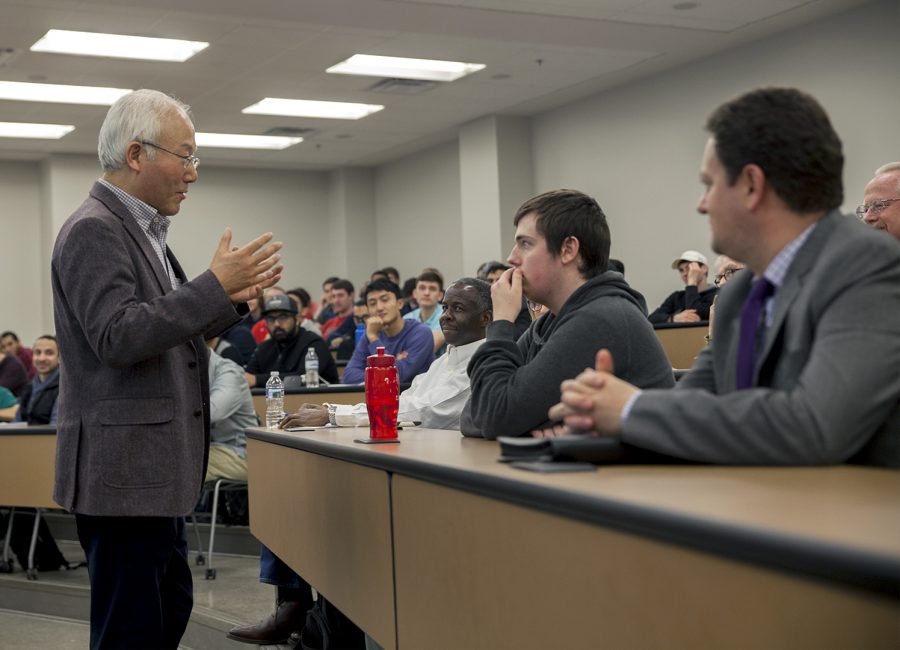Samsung senior vice president speaks on Korean language
April 10, 2017
Samsung’s senior vice president of electronics, Dochul Choi, spoke to a crowded room in Snell Hall on Friday, hosted by the engineering department in conjunction with the international year of South Korea.
Choi’s presentation primarily focused on the Korean written language, including its history, ease of learning, and role in turning South Korea from a country ravaged by war and poverty into an information technology power.
Choi was born in South Korea in 1950 and grew up in a country deeply affected by poverty caused by the Korean War.
He has been with Samsung since 2004. Before joining Samsung, he worked with United Technologies Research Center. He received his Ph.D. and MS degrees from Pennsylvania State University.
He spoke about Samsung’s success and how it would translate to an American company. The two cultures are so different, he said, that there is no point in trying to replicate Samsung’s success in the U.S.
“There is no way you can use what Samsung used in the USA,” Choi said. “So there is no point to talking about success DNA; it depends on who you are.”
He spoke about Samsung’s rivalry with Apple. He then held up an iPhone. He said Samsung makes more money from iPhones than they do from its own devices.
“This is a good phone. Steve Jobs did a wonderful job,” Choi said. “We make almost half of it at Samsung. If you open it up, there is a lot of Samsung-made chips.”
After showing a video presentation on the creation and history of the Korean language, he went on to talk about the simplicity of the language, especially when compared to Chinese.
“I usually can teach Korean alphabet within hours,” Choi said. “Knowing the meaning is very difficult, but I can teach you how to read and write.”
Choi credited the simplicity of the Korean alphabet to the rise of South Korea as a technology power since 1985. He said because the Chinese alphabet was too complicated for early 8-bit processors, the Chinese and Japanese were forced into using much more expensive parts on their early personal computers.
“Their PC became very expensive,” Choi said. “People could not afford to buy it. In Korea, our system became very inexpensive.”
After his presentation, he answered questions from members of the audience. He responded to a question from a student about Samsung’s failed Galaxy Note 7 smartphone, which suffered from exploding batteries. He compared the issues to those of Sony Laptops and Boing Dreamliner airplanes.
“That was a big mistake by Samsung,” Choi said. “We spent about 5 billion dollars to recover all of the phones.”
During the question and answer session, Terral G. Holmes, of Holmes Radio and T.V. Service in Franklin, Kentucky, made a comment about Samsung’s consumer electronics.
“It’s just so fascinating how you do make things simple,” Holmes said. “Even in your troubleshooting, for people to troubleshoot your goods, it’s just simplicity. It’s just so good compared to the other brands out there.”
Choi also responded to a question about whether or not he recommended that students get an MBA.
“Being a good, competitive engineer, is just as good as any MBA,” Choi said. “It doesn’t matter what school it is, an MBA isn’t as good as being a good, true, engineer.”
Reporter Matt Stahl can be reached at (270) 745-0655 and [email protected].













